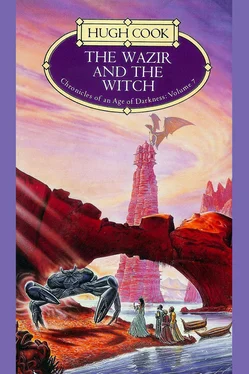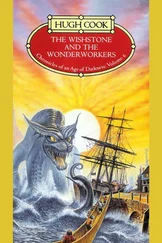Hugh Cook - The Wazir and the Witch
Здесь есть возможность читать онлайн «Hugh Cook - The Wazir and the Witch» весь текст электронной книги совершенно бесплатно (целиком полную версию без сокращений). В некоторых случаях можно слушать аудио, скачать через торрент в формате fb2 и присутствует краткое содержание. Жанр: Фэнтези, на английском языке. Описание произведения, (предисловие) а так же отзывы посетителей доступны на портале библиотеки ЛибКат.
- Название:The Wazir and the Witch
- Автор:
- Жанр:
- Год:неизвестен
- ISBN:нет данных
- Рейтинг книги:5 / 5. Голосов: 1
-
Избранное:Добавить в избранное
- Отзывы:
-
Ваша оценка:
- 100
- 1
- 2
- 3
- 4
- 5
The Wazir and the Witch: краткое содержание, описание и аннотация
Предлагаем к чтению аннотацию, описание, краткое содержание или предисловие (зависит от того, что написал сам автор книги «The Wazir and the Witch»). Если вы не нашли необходимую информацию о книге — напишите в комментариях, мы постараемся отыскать её.
The Wazir and the Witch — читать онлайн бесплатно полную книгу (весь текст) целиком
Ниже представлен текст книги, разбитый по страницам. Система сохранения места последней прочитанной страницы, позволяет с удобством читать онлайн бесплатно книгу «The Wazir and the Witch», без необходимости каждый раз заново искать на чём Вы остановились. Поставьте закладку, и сможете в любой момент перейти на страницу, на которой закончили чтение.
Интервал:
Закладка:
Before Tin Char escaped to the deserts of Zolabrik, he had time sufficient to tell a couple of his most trusted friends of the ordeal he had endured as a slave of the Monster of Jod. And by noon the next day the tale was all over Injiltaprajura, its details confirming to one and all that the Crab truly had made itself wazir.
‘What happened to that Tin Char fellow?’ said the Crab on the morrow.
‘Oh, him,’ said Chegory. ‘I think he’s gone to stay with his mother-in-law.’
‘Hmmm,’ said the Crab, digesting this, and simultaneously digesting a very large chunk of moray eel. ‘I wish I had a mother-in-law. Or even a mother, come to that.’
‘Never mind,’ said Olivia, saddened by the desolation in the Crab’s voice. ‘You must have had a mother once. That’s something, at any rate.’
‘No,’ said the Crab sadly. ‘I never had a mother.’
‘But you must have!’ said Olivia. ‘Your own little mother, running around under rocks and things. Then she met a daddy crab and they fell in love. So they got married. There was a feast, of course. They had shrimps, seaweed, sea anemones, all kind of things. Then they set up house together and had little crabs of their own, dozens of them maybe. There must still be lots of them left. Brother crabs, sister crabs, uncle and aunt crabs. Maybe none of them can talk, but they’re out in the harbour somewhere. So don’t feel lonely. You have got a family, really. They look just like these little crab shells I brought for you, and that’s a fact.’
The Crab sighed.
Its sigh sounded like a drowning diver bubbling helplessly deep, deep beneath water.
‘I wish it was true,’ said the Crab. ‘I wish I really did come fro m the sea. Or from the land, at the very least.’ ‘Well, you must have, ’ said Olivia. ‘I mean, you’re either a land crab or a sea crab. You m ust be one or the other. That’s logical.’
‘I’m neither,’ said the Crab. ‘I wasn’t born on the land, and I wasn’t born in the sea either. I was born in the fires of the local sun.’
‘No,’ said Olivia, ‘you can’t have been, you silly. The sun’s too hot. Your legs would have been burnt off the moment you were born.’
‘I didn’t have legs,’ said the Crab. ‘Or ears. Or eyes. Or a stomach, even.’
‘You mean,’ said Chegory, ‘you were a deformed baby?’
‘I was no kind of baby at all,’ said the Crab. ‘I was born as a.. a perturbation of chance and change. That’s how my people live. We live by… by changing chance. Modifying local probability. But a star’s the place for that, not a planet. So when I had to flee the sun, I had to find a form for myself as soon as I landed on the planet. Do you understand? Sun? Star? Planets?’
‘Oh yes,’ said Olivia. ‘The sun’s a sea urchin and the planets are the pieces of kumera. That’s how old Pokrov explained it. Then Artemis Ingalawa came along and told him to stop playing with his food.’
‘The sun?’ said the Crab. ‘A sea urchin? Child-’
‘I’m not a child,’ said Olivia Qasaba impatiently, though it was one of her days for playing the child to the hilt. ‘I’m a mature adult. Of course I know the sun’s not a sea urchin. It’s a sustained thermonuclear reaction converting the light to the heavy. Hydrogen to helium and so forth. You end up with iron. Or the star goes bang, one or the other. Gravity. Energy conversion. Inverse square laws. All that. And the planets, greasy old planets, rocks and stuff, Jof, Nan, Bruk, Hikorla-barus. Then Skrin, which is what we’re standing on. Then Pelothiasis, Mog, Ompara, Belthargez.’
All this said Olivia, and only good manners prevented her from saying rather more. She resented having her sea urchin whimsy so casually destroyed. And resented, too, being patronized — albeit by a Crab. She had spent much of her life in the study of the higher sciences, including Thalodian Mathematics itself, and therefore took umbrage at being lectured on basics.
‘Jof?’ said the Crab. ‘You call a planet thus? Those other names.. what were they? Nan? Hokarbrus?’
‘Hikorlabarus,’ said Olivia.
‘Those are no planet names,’ said the Crab. ‘You stand in error, for the local astronomers call the planets-’
‘We know,’ said Olivia, most definitely in no mood for another lecture.
‘Those names Olivia quoted are Shabble’s names,’ explained Chegory.
‘Shabble’s names?’ said the Crab.
‘Shabble, you know,’ said Chegory. ‘You’ve met Shabble, haven’t you? Shabble’s a priest now. The Cockroach, that’s what it’s all about. But anyway, Shabble talks lots about the sun, the planets, all that stuff. Pokrov only said about it that once, the time with the sea urchin. On Ingalawa’s best tablecloth! But Shabble talks about it often, going to the sun and all that stuff.’
‘Shabble went to the sun?’ said the Crab.
‘In a ship,’ said Olivia. ‘A special ship. Maybe Shabble knows where you could find a ship like that. You could go back to the sun. Would you like that? If that’s where you came from, maybe you’d be happier there.’
‘No,’ said the Crab with infinite sadness. ‘I can never go back. There was a… a religious argument, you see.
I espoused a heresy. I had to flee for my life. If I go back, they’ll kill me.’
‘A heresy?’ said Chegory. ‘What was it?’
‘My… my theory of time,’ said the Crab. ‘I held that time must have had a start. For how could infinite time have passed? You know the mathematics of infinity?’
‘Intimately,’ said Chegory.
Unlike Olivia Qasaba, Chegory Guy had been defeated by the intricacies of Thaldonian Mathematics; but he had mastered simplicities such as infinity with ease.
‘Well then,’ said the Crab, ‘infinity by definition has no end. But time past has most definitely ended, for here we are in the now. It follows that there cannot be infinite amounts of past time — that is, history. Therefore, there must have been a start. A start implies a cause. Which means we should have shared the sunspin, not dividied it.’
‘The sunspin?’ said Chegory. ‘You’ve lost me.’
The Crab did its best to explain, but, though the intricate ramifications of its heresy may have been obvious to a sun-born creature, they were virtually impossible for a planet-bound creature to understand. The Crab began to get frustrated.
‘Never mind,’ said Olivia consolingly. ‘We understand the important things. You were born in the sun and you can’t go back. You came here and became a Crab. That’s all right. There’s lots of good things about being a Crab. I mean, you’ve got the most marvellous appetite. Look at how much you eat! Do you ever get indigestion? Of course not. Better still, you could rule the world if you wanted to.’
‘I don’t want to,’ said the Crab.
‘Why not?’ said Olivia.
‘Because it would mean an enormous amount of work for no reward,’ said the Crab.
‘But you could have… well, palaces and things,’ said Olivia.
‘I could have a palace now if I wanted one,’ said the Crab. ‘I don’t have to live in a cave, you know. I could move into the Analytical Institute. But there’s no point. Not when you’re a Crab. This body, you see, it’s…’
The Crab did not elaborate. It had no need. The drawbacks of being a huge Crab was obvious. One was too big to enter most buildings and too heavy for most boats. One could take no pleasure in soft chairs or padded beds. One’s uses for compliant human flesh were strictly constrained by anatomical awkwardness.
The list of drawbacks could be extended.
‘So you want to be human,’ said Chegory.
‘That’s all right,’ said Olivia Qasaba. ‘You will be, won’t you? Justina said as much. She promised to find you this organic rectifier. It’s magic, that’s what it is. It’ll make you a body as good as mine.’
Читать дальшеИнтервал:
Закладка:
Похожие книги на «The Wazir and the Witch»
Представляем Вашему вниманию похожие книги на «The Wazir and the Witch» списком для выбора. Мы отобрали схожую по названию и смыслу литературу в надежде предоставить читателям больше вариантов отыскать новые, интересные, ещё непрочитанные произведения.
Обсуждение, отзывы о книге «The Wazir and the Witch» и просто собственные мнения читателей. Оставьте ваши комментарии, напишите, что Вы думаете о произведении, его смысле или главных героях. Укажите что конкретно понравилось, а что нет, и почему Вы так считаете.












